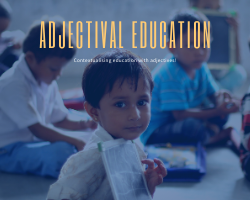In simple words, ‘Adjectival Education’ means adding adjectives like ‘Climate Change’, ’Gender’, ‘Environment’ with education to contextualize it. In your junior classes, you all had subjects like Environmental Sciences, some chapters regarding pollution and global warming at the end of science books, and those little boxes stating facts like - ‘The yellowing of the Taj Mahal is due to acid rain’. Adding these “Did You Know” boxes and a few chapters at the end never amounts to a lot of learning. The only reason you probably studied the pollution chapter at the end of your chemistry books was to score higher grades in the subject and you mostly neglected the little ‘Did You Know’ boxes because you didn’t expect questions from those in your tests or exams.
Sometimes your Economics teacher used words like ‘poverty’ and ‘hunger’ to teach you economic concepts, but it usually has little to do with ‘hunger’ or ‘poverty’ and more to do with the economic concept. This is because the primary goal of the example is not to make you well versed with the adjectives used in the subject. In the end, the use of poverty and hunger is just a method of helping you understand a concept instead of helping you understand poverty and hunger itself.

Moreover, even if some teachers do help you understand problems regarding Sustainable Development, they can only provide you with their subject perspective on it. An economics teacher would only help you look at sustainability from an economic lens; a psychology teacher can help you look at it from a psychological lens. Studying sustainability differently with different subjects prevents you from looking at sustainability as a whole.
Adjectival education helps you look at problems but it does not give you the incentive to devote yourself to understanding them and implementing measures to solve these problems at your own personal level. Hence you can safely conclude that even though adjectival education can be used to make students aware, it does little to drive and motivate them to take action against these problems.
Read our next blog to understand how Education for Sustainable Development can help overcome the shortcomings of Adjectival Education and bring about a real behavior change needed today to achieve the SDGs.
Brainwiz is using Education for Sustainable Development as a tool to enhance 21st-century skills and socio-emotional learning competencies of students to make them better suited for work-life challenges of the future. Get in touch with us to know more.


